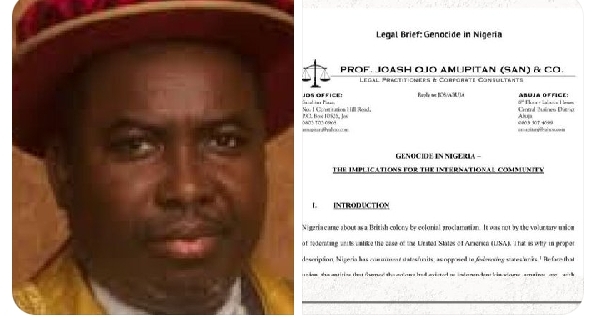
In the paper, Amupitan declared that “it is a notorious fact that there is perpetration of crimes under international law in Nigeria, particularly crimes against humanity, war crimes and genocide.”
Facts have emerged on how Nigeria’s newly appointed Independent National Electoral Commission (INEC) Chairman, Prof Joash Ojo Amupitan (SAN), authored a legal brief in a 2020 report that explicitly described alleged mass killings and violent campaigns in Nigeria as acts of genocide.
The media which obtained the report titled “Nigeria’s Silent Slaughter” on Thursday saw that the Senior Advocate of Nigeria, in his legal brief, called for urgent international intervention to stop what he termed “pogrom and attacks against the Christians and minority groups in Nigeria.”
The article of Amupitan, recently appointed by President Bola Tinubu to head the country’s electoral commission, is titled “Legal Brief: Genocide in Nigeria – The Implications for the International Community.”

Meanwhile, the complete report was published by The International Committee on Nigeria (ICON), a consortium of Nigerians and global advocates for human rights and religious freedom.
The document, signed under his law firm — “Prof. Joash Ojo Amupitan (SAN) & Co. Legal Practitioners & Corporate Consultants”, bears the firm’s Jos and Abuja addresses, confirming his authorship long before his appointment by President Bola Tinubu.
In the paper, Amupitan declared that “it is a notorious fact that there is perpetration of crimes under international law in Nigeria, particularly crimes against humanity, war crimes and genocide.”

He lamented what he described as the government’s failure to prosecute offenders and protect minority citizens, warning that Nigeria risked repeating “the Rwandan and Sudanese mistakes” where the world stood by as ethnic massacres unfolded.
“While the country is trying to manage the concerns engendered by the clamour for self-determination,” he wrote, “two violent extremist groups have emerged to exacerbate an already deteriorating situation… Boko Haram and the Fulani herdsmen, responsible for an orgy of bloodbath and massive displacements in many States across Nigeria.”
He noted that although Boko Haram had been formally designated a terrorist organisation in 2013, the Fulani herdsmen — whom he directly accused of orchestrating widespread massacres — had not been officially recognized as terrorists, but rather “labelled a terrorist group.”

Amupitan’s legal analysis went beyond mere condemnation.
He accused the Nigerian government of constitutional failure, asserting that the neglect of the state to prosecute alleged perpetrators had made international intervention “a moral and legal necessity.”
“The victims of the crises are mainly the Christian population and the minority ethnic groups in Nigeria,” the brief stated, “and hence the need for remedial actions under the international law.”
He stressed that the “basis of intervention” was the government’s “neglect of its constitutional responsibility to provide welfare and security for the citizenry being the primary purpose of government.”
Tracing the historical roots of Nigeria’s ethno-religious conflicts, Amupitan wrote that the “drive for Islamisation of Nigeria through the jihad of 1804” had now reappeared through modern extremist movements. He described the Fulani-led jihad of Uthman Dan Fodio as a “full-blown Islamization agenda”, arguing that the same ideological undercurrent still drives much of the current violence in northern Nigeria.
“Following the 19th century jihad of Uthman Dan Fodio,” he explained, “the Hausa territories were conquered and the Sokoto Caliphate established… The success of the jihad was one of the religious triumphalism that aimed at expanding the caliphate to other parts of Nigeria in the irrevocable bid to dip the Quran into the Atlantic Ocean in Lagos.”
Amupitan linked that legacy to Nigeria’s modern-day insecurity, asserting that “the caliphate thereafter became a dominant force in the north,” and that subsequent governments had continued to protect its influence through political manipulation and systemic favoritism.
The legal brief also accused Nigerian authorities of deliberately avoiding the term “genocide” to escape international accountability:
“States are skeptical of naming ‘genocide’ the way it is to avoid committing resources to stop it and to punish perpetrators,” he wrote. “Such States easily find cover under the principle of complementarity… Concealing genocide becomes a strategy to guard sovereignty and protect ego, at the expense of innocent lives.”
He added that “there is nothing as devastating as losing a group whose identity enjoys some specificity, uniqueness, and permanency that can neither be replaced nor easily replaceable.”
Prof. Amupitan concluded his paper by making a direct appeal to the United Nations and global powers to intervene in Nigeria’s crisis:
“The alleged involvement of the State and non-State actors in the commission of crimes under international law in Nigeria has complicated an already complex situation,” he wrote. “Consequently, the situation beckons the urgent need for a neutral and impartial third-party intervention, especially the UN and its key organs, the military and economic superpowers.”
He emphasised that international law supersedes absolute state sovereignty in cases of genocide and crimes against humanity, writing:
“In a globalised world, State sovereignty diminishes to accommodate the common interests of the global community concretised by a mixture of consent, consensus and compelling norms.”
Leave a Reply